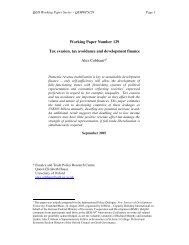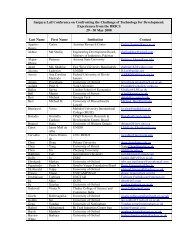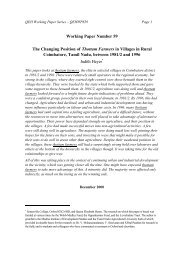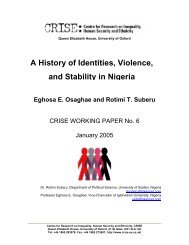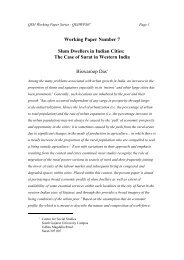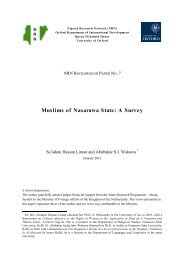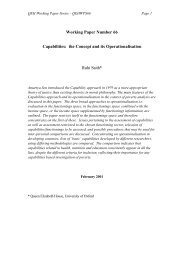Acute Multidimensional Poverty: A New Index for Developing ... - OPHI
Acute Multidimensional Poverty: A New Index for Developing ... - OPHI
Acute Multidimensional Poverty: A New Index for Developing ... - OPHI
You also want an ePaper? Increase the reach of your titles
YUMPU automatically turns print PDFs into web optimized ePapers that Google loves.
<strong>Acute</strong> <strong>Multidimensional</strong> <strong>Poverty</strong>: A <strong>New</strong> <strong>Index</strong> <strong>for</strong> <strong>Developing</strong> CountriesAlkire & SantosThe MDGs catalysed the collection and compilation of comparable international data related to theagreed goals and targets. The MDG statistics are presented annually and have been tremendouslyuseful in providing feedback regarding improved development outcomes and in creating incentivesto address core deprivations.Unlike the MPI, however, the international MDG reports invariably report progress on eachindicator singly. No composite MDG index has been developed, and few studies have reflected theinterconnections between indicators. The reason that no composite MDG index has been developedis plain to see: the ‘denominator’ or base population of MDG indicators differ. In some cases it is allpeople (malnutrition, income); in some cases children (primary school, immunization), or youth 15-24 (literacy), or childbearing women (maternal mortality), or households (access to secure tenure),and so on. Some environmental indicators do not refer to human populations at all. Given thisdiversity of indicators, it is difficult to construct an index that meaningfully brings all deprivationsinto the same frame.What the MPI does in relation to the MDGs is the following. First, it employs indicators that relateto the MDGs: 8 of the 10 indicators are directly linked to MDGs; the other two (electricity, flooring)are plausibly related. Second, the MPI establishes the ‘base’ population as being the household.People live in households, the suffering of one member affects other members, and similarly theabilities of one member (e.g. literacy) often help other household members. Third, within theseparameters, insofar as data permit, the MPI illuminates the simultaneous deprivations of households.This enables us to identify different ‘types’ of deprivations – clusters of deprivations that occurregularly in different countries or groups. Such a measure can thus contribute to a betterunderstanding of the interconnectedness among deprivations, can help identify poverty traps, andcan thus strengthen the composition and sequencing of interventions required to meet the MDGs.It is indeed our hope that the MPI will support ef<strong>for</strong>ts to accelerate progress towards the MDGs.Figure 1: Tracking the MDGs bypercentage of developing countriesA final comment on the MPI analysis in comparison withthe MDG reports is that in this paper we have oftenfocused our results on people rather than nations. ManyMDG reports identify the percentage of countries that are‘on target’ to meet the MDGs. Suchanalyses do not present anyin<strong>for</strong>mation on the actual number ofpeople who are deprived – althoughthe MDGs were deemed feasible ata global not national level.Reporting the MDGs entirely interms of countries deeply underemphasisespoor people in largecountries. India has 3,000 times asmany people as the Maldives, buteach contribute equally as one South Asian country. In effect, this means that each Indian citizen’slife is weighted 1/3000 th as much as a citizen of the Maldives. This aspect of the MDG reportingsystem is pervasive, affecting all Global Monitoring Reports (the above figure is from p 25 of the 2010Report), <strong>for</strong> example, and summary tables on progress to achieving the MDGs. Yet in a humanrights-based approach and many other ethical approaches, every human life is to be given equalweight. For this reason, our analysis of MPI emphasizes the number of people whose lives arewww.ophi.org.uk July 2010 8



